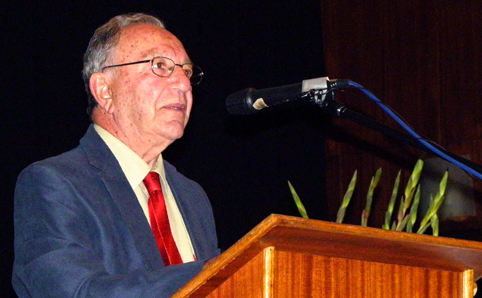Latest News Archive
Please select Category, Year, and then Month to display items
14 June 2024
|
Story Anthony Mthembu
|
Photo Suplied
 Jeremiah Hlahla, a UFS student completing his PhD in Botany at the University of Debrecen as part of an exchange initiative funded by the Erasmus+ Mobility Programme.
Jeremiah Hlahla, a UFS student completing his PhD in Botany at the University of Debrecen as part of an exchange initiative funded by the Erasmus+ Mobility Programme.
As part of an exchange initiative facilitated by the Erasmus+ Mobility Programme, Jeremiah Hlahla, a student at the University of the Free State (UFS), is nearing the completion of his PhD studies at the University of Debrecen in Hungary. Hlahla’s journey, which began in February 2024 and is set to conclude in July 2024, has been a remarkable learning opportunity. “As a first time-traveller to Europe, I have thoroughly enjoyed engaging with people from different countries and cultures,” he said.
The benefits of international collaboration
Hlahla is currently pursuing a PhD in Botany, focusing on plant stress physiology. “My current PhD project investigates the physiological, biochemical and morphological responses of vegetable-type soybean, or edamame, to combined drought and heat stress,’’ he explained. He considers the University of Debrecen the ideal institution to complete his research due to its extensive expertise and resources in similar projects. He noted that his colleagues at Debrecen conduct significant work on plant protection against biotic and abiotic stresses, including salt and drought stress, as well as proteins and amino acids in barley and other legumes.
Given the vast knowledge available on similar projects, Hlahla has found substantial engagement with his work at the University of Debrecen. “Upon arrival, I delivered an introductory lecture presenting my UFS project on the synergistic effects of combined drought and heat stress on the physiology and biochemistry of edamame. It was an engaging session as everyone could relate to my work and asked many questions,’’ he said.
Insights gained from the exchange
Hlahla has also gained valuable lessons that will assist him in his research career, including biotechnology and physiology tools. “I learned how to prepare samples and use high-performance liquid chromatography (HPLC) and reversed-phase ultra-high-performance liquid chromatography (UHPLC) to quantify proteins and amino acids,’’ he said. These techniques are beneficial not only for his current work but will also support future soybean research.
As his experience at the University of Debrecen nears its end, Hlahla reflects on the collaborations and friendships he has formed, which stand out as a significant highlight.
UFS hosts final ANC Centenary Seminar for 2011
2011-11-28
 |
|
Prof. Benjamin Turok speaking about the Evolution of Economic Policy Thinking.
Photo: Henco Myburgh
|
The African National Congress (ANC) government is faced with the dilemma of an inherited distorted economy. Subsequently South Africa has the most unequal society in the world. That is according to Prof. Benjamin Turok, head of Political Education for the ANC in Parliament. Prof. Turok spoke at an ANC Centenary Dialogue at the Bloemfontein Campus of the University of the Free State (UFS) on 23 November 2011.
Delivering the last lecture of the year in a series of dialogues about the ANC, Prof. Turok said it was hard to swallow that after 100 years there is still inequality. This for a party whose essence is the notion of sharing, as set out in the Freedom Charter. Prof. Turok told the audience in a packed Odeion Theatre that the ANC Centenary provided a moment of reflection. “If we neglect the poor and uneducated and do not interfere and direct investment, we will always have inequality.”
Talking about youth unemployment, Prof. Turok said that no society can live in peace if young people are not employed. He said that he welcomed the energy the ANC Youth League has put in economic policy, but would like to see a youth league economic policy that is scientific.
The ANC Centenary Dialogue series has been hosted by the Centre for Africa Studies and will continue on 15 February 2012.